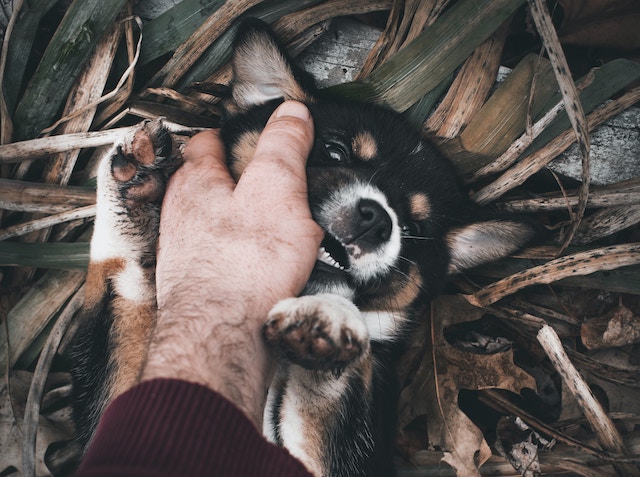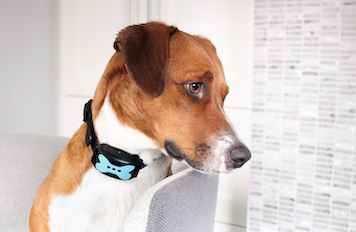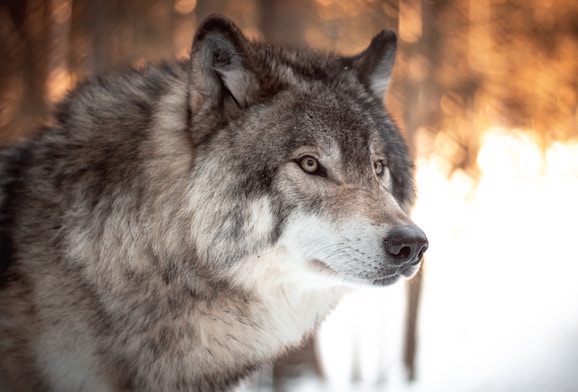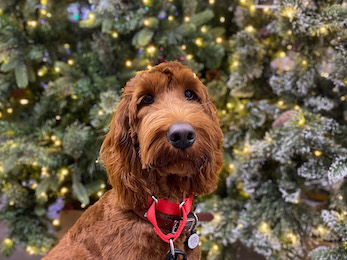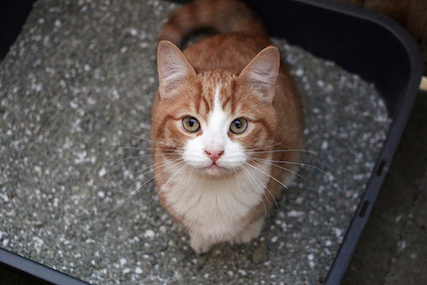After feeling needle-sharp teeth sink into your skin enough times, you might start to wonder, why is my puppy biting and how can I get them to stop? Puppy play-biting can be a perfectly normal behavior as it helps puppies develop social skills with their littermates and is a crucial part of play. Puppy biting is abnormal when puppies bite to get you to stop touching them or their toys or when it is fear-related biting directed towards their vet, groomer, or other strangers. I also consider any puppy biting that breaks the skin to be abnormal (unless you have very delicate skin).
In some of my previous blogs, I’ve already touched on how you can use positive reinforcement to stop puppy play-biting and how to recognize signs of normal vs. abnormal puppy biting. In this blog, I want to get to the root of the issue of why your puppy is biting because once we know the reason behind the problem, we can create a treatment plan and put a stop to unwanted puppy biting.
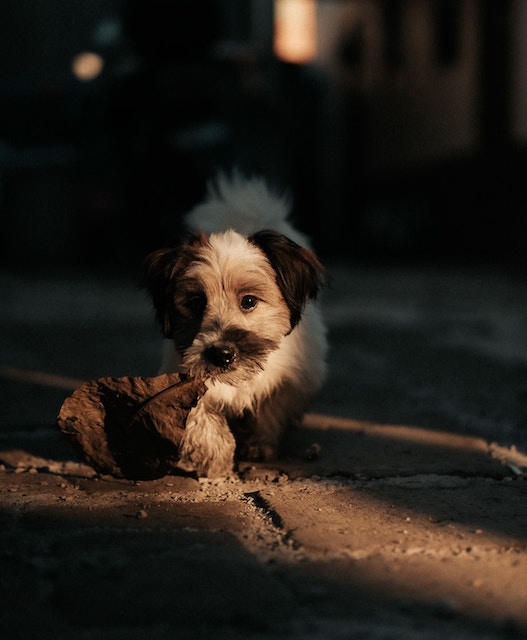
Why Is My Puppy Biting Everything?
Puppies are oral creatures that use their mouths to explore the world around them. We commonly see puppies bite furniture, any items that resemble plush toys such as pillows, blankets, and curtains, and your clothing such as classic shoes and socks. They bite to communicate, to seek attention, or simply because it feels good. Puppies will chew on everything in sight until you communicate what is appropriate for them to chew on and what is not. Many people think puppy biting is just due to puppy teething. Puppy teething typically stops when a puppy’s 28 razor-sharp baby teeth fall out and make room for 42 brand-new adult teeth, typically at 6 months old. However, just because a puppy is teething, does not mean you or your things need to be the target of that teething. Puppies can easily teeth only on their toys once they understand that is what’s expected of them.
I consider puppy biting to be abnormal when puppies start grabbing items and swallowing them whole or partially whole quickly after picking the item up. An example of this could be a puppy going outside and swallowing debris such as acorns, sticks, and rocks in a rapid, frantic manner. As puppies age, this could also happen with dryer sheets and socks indoors. Swallowing items whole without chewing could be a sign of early resource guarding.
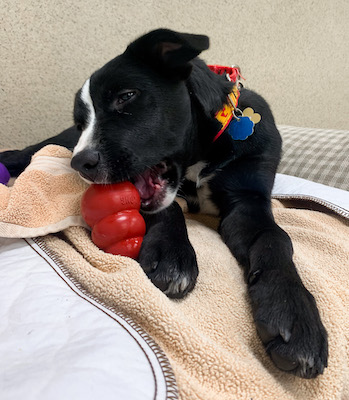
What to do about it:
The first step to getting your puppy to stop biting everything is to set their environment up for success. Your puppy should have access to 8-12 appropriate toys at all times, indestructible toys that do not resemble any household items. Examples of appropriate toys include Nylabones, Kongs, and cow bones to name a few. Next, practice these play-biting exercises and feed some of your puppy’s meals out of food-dispensing toys. This should significantly curb your puppy’s biting and give them options of what to put their mouths on when the desire arises.
Why Is My Puppy Biting Me?
Your puppy could be biting you as a normal way to get your attention or as an abnormal method to get you to stop doing what you’re doing as it relates to body handling. Puppy play-biting directed towards you or other family members is abnormal when that biting breaks the skin. Puppies that play-bite too hard were typically taken away from their littermates too young and did not learn proper bite inhibition, or maybe they did not have littermates at all.
If your puppy is biting aggressively when being touched in certain contexts such as being picked up, putting a collar or harness on, or being handled by the groomer or vet, your puppy may be touch-sensitive. Puppies that are touch-sensitive are overly sensitive to touch and show signs of aggression when handled in certain contexts. Biting is usually preceded by stiffening, low growling, and barring teeth or lip curling. A few risk factors for touch sensitivity include being housed in small spaces like puppy mills or pet stores, being taken from the litter before 8 weeks, and having little or no littermates.
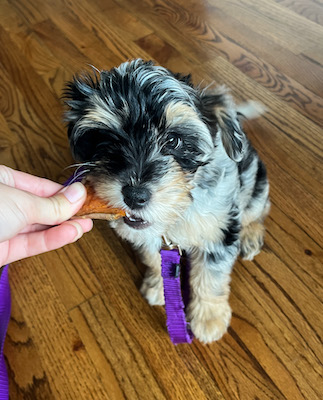
What to do about it:
Body handling exercises can help build a more positive association with touch in puppies that are touch-sensitive. Gently touch your puppy’s ear or paw and feed a piece of dog food or a treat. Pet parents of food-motivated puppies can use the puppy’s plain dog food, others may need to use tastier treats. Repeat 10-20 times on all body parts, especially common ones handled by a groomer or vet. Practice approaching your puppy, picking them up, feeding them, and putting them back down. It’s your goal to teach your puppy that being touched results in good things!
If your puppy is showing signs of touch sensitivity, the behavior should be addressed immediately before the behavior worsens. Once proper treatment is implemented, you should see a difference in your puppy’s behavior quickly—usually within a few days. Unfortunately, like many other problem behaviors, touch sensitivity only gets worse with age. For those pet parents whose puppy does not seem to be sensitive to touch, I recommend practicing these body handling exercises to keep your puppy relaxed to touch. This helps safeguard your puppy for times when touch might result in pain, preventing them from becoming touch-sensitive adult dogs.
Why Is My Puppy Biting Other People?
If your puppy is greeting new people with wiggly body language, jumping, and play-biting, this is normal puppy behavior. Jumping and play-biting are attention-seeking behaviors that should be addressed but are not huge causes for concern because these are normal behaviors seen in most puppies.
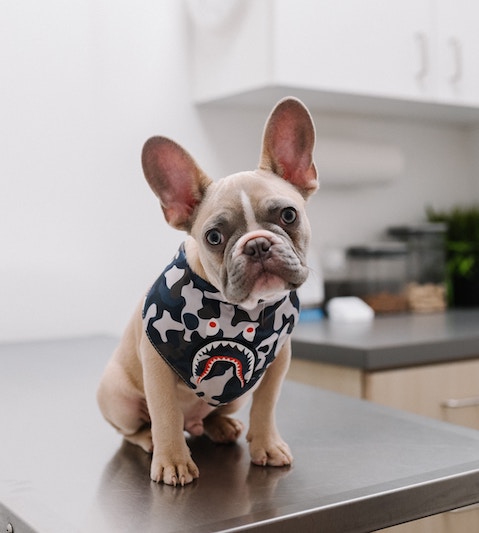
Abnormal puppy biting falls outside of these attention-seeking behaviors and is often times directed at a groomer or veterinarian. Biting at the groomer and vet is concerning to me when it’s in response to your puppy being handled. This type of biting could be coupled with fear-based behavior such as cowering, tail tucked between legs, and stiff body language. Puppy biting in this context signals to me that the puppy is most likely touch-sensitive.
Abnormal puppy biting can also be directed at other unfamiliar people. In these cases, puppies are often super shy and freeze when they are approached by other people. In this context, puppies bite to get the person to go away. This type of biting is rare and often is due to a puppy being put into a terrifying situation with a person. The puppy has shown signs of avoiding the person, but no one seems to notice or understand the gravity of the puppy’s body language.
What to do about it:
If your puppy is engaging in biting due to touch sensitivity or fear towards people, we recommend contacting your local Certified Applied Animal Behaviorist immediately so that the behavior does not continue to worsen, resulting in severe aggression, once your puppy reaches adulthood. We have in-home puppy training programs specifically designed by myself and our team of professionals to address problem behaviors such as touch sensitivity and reactivity. We can even do puppy training sessions at the vet or groomer or with guests as we address the behavior wherever it occurs naturally in your day-to-day life.
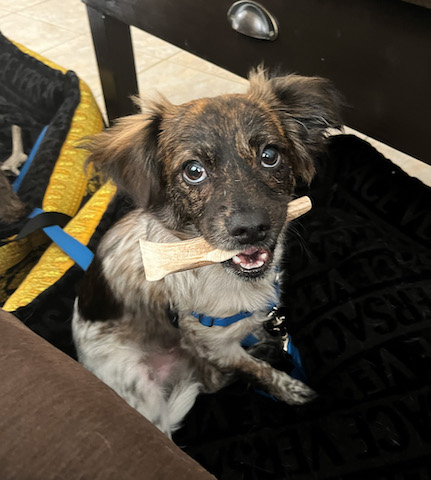
When Does Puppy Biting Stop?
Normal puppy biting does not lessen until adulthood and abnormal puppy biting worsens into adulthood! So, unfortunately, time does not solve puppy biting. It is much more about what is done during that time. Using a functional approach, we put a stop to puppy biting. First, we identify why a puppy is biting. Then, we create an appropriate treatment plan, customized to your puppy, to address the biting. The good news is, after implementing a proper treatment plan, your puppy’s problem biting can be significantly reduced within three days and, in many cases, is completely gone within one month.
I hope you have a better understanding as to why your puppy is biting and the first steps you can take to address the behavior. If you are still unsure as to why your puppy is biting, schedule a call with our Co-Founder Sean Savage for a free training consultation to get a personalized training recommendation.
*This page contains affiliate links. If you choose to purchase after clicking a link, we may receive a commission at no extra cost to you.*
